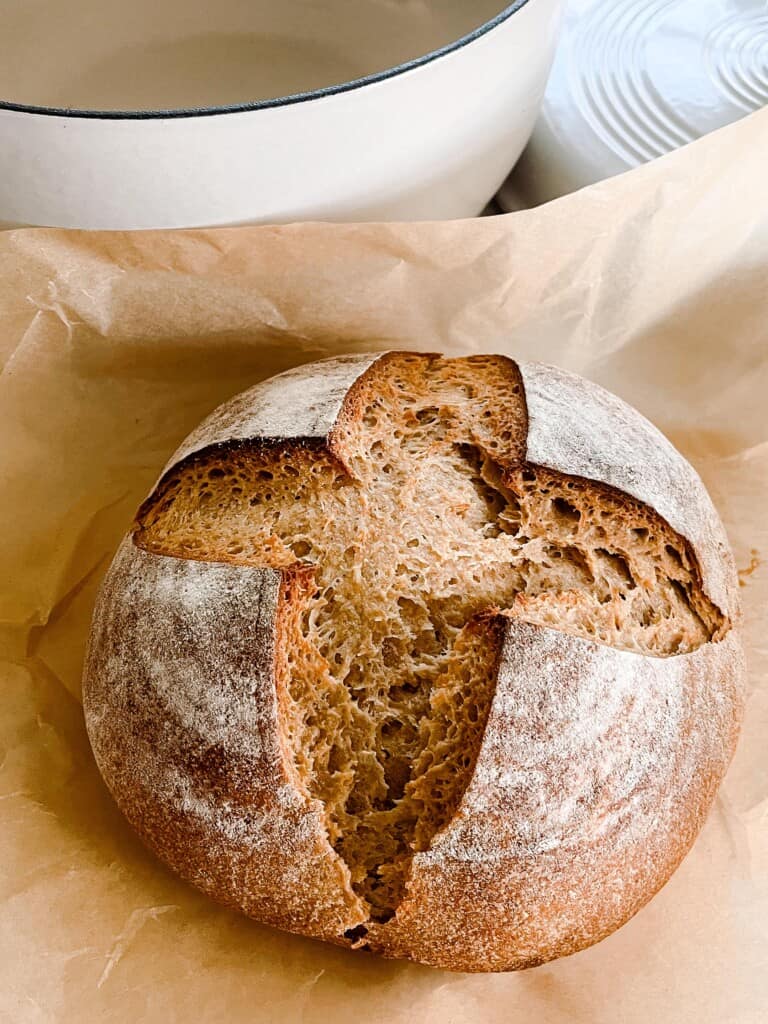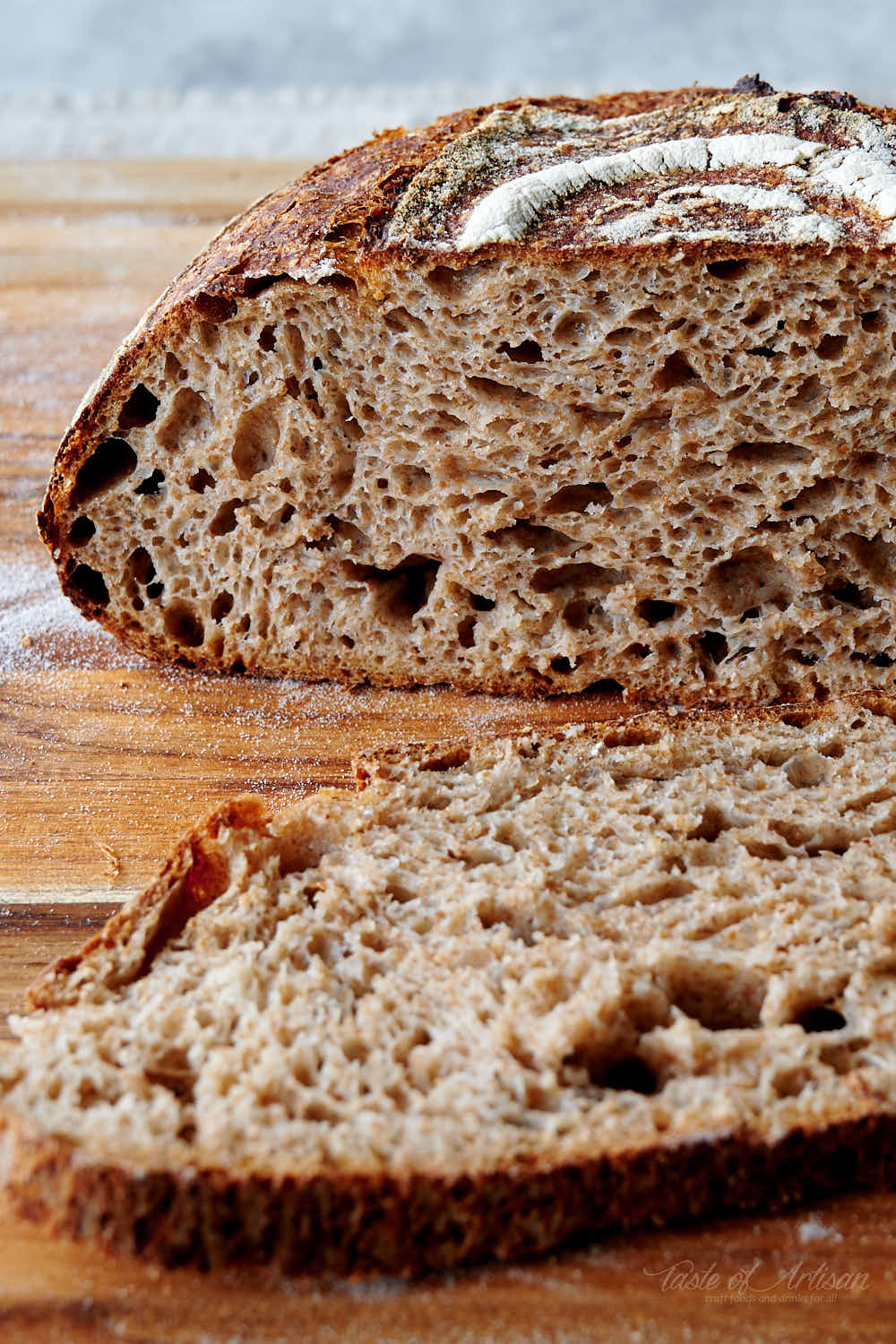
Whole Wheat Sourdough Health Benefits: Unlock PACHA Nutrition Secrets
Key Points
-
Whole wheat sourdough is a nutritional powerhouse, providing fiber, vitamins, and minerals.
-
The sourdough fermentation process aids digestion and enhances nutrient absorption.
-
Consuming whole wheat sourdough can help regulate blood sugar levels due to its low glycemic index.
-
Whole wheat sourdough, rich in antioxidants, supports overall health and can help combat inflammation.
-
Choosing PACHA whole wheat sourdough means you’re choosing organic, non-GMO, and allergen-free bread.
Whole Grain Benefits in Every Bite
Picture taking a bite of a bread slice that’s not only tasty but also filled with nutrients your body will appreciate. That’s what you get with whole wheat sourdough. It’s not just any bread; it’s a piece of health, made through traditional fermentation methods that unleash the full power of whole grains.
Packed with Fiber and Nutrients
Whole wheat sourdough is a nutritional powerhouse. In contrast to white bread, which has had its natural nutrients removed, whole wheat sourdough keeps the bran and germ of the wheat kernel. This means it’s full of dietary fiber, which is essential for a healthy digestive system. But that’s not all; this bread is also a great source of B vitamins, including niacin, thiamin, and folate, which are key for energy production and brain health.
Helps Keep Blood Sugar Levels Steady
In a world where sugar spikes are a common concern, whole wheat sourdough is a great ally for your blood sugar levels. The complex carbohydrates found in whole grains are broken down more slowly in the body, providing a more constant source of energy without the highs and lows. Plus, the sourdough fermentation process further lowers the bread’s glycemic index, making it a wise choice for those managing their blood sugar.
In addition, the acids that are created during the fermentation of sourdough can slow down the process of your stomach emptying. This can make you feel fuller for longer and decrease the chances of you overeating. This can be especially helpful for those who are trying to maintain or reach a healthy weight.
Boosts Digestive Health
Whole wheat sourdough is a gut-friendly food. The fermentation process of sourdough creates prebiotic fibers, which are indigestible food components that feed the beneficial bacteria in your gut. It’s like throwing a feast for your gut’s microbiome, helping to maintain a balanced and healthy digestive system. When you eat whole wheat sourdough, you’re not just feeding yourself, but also nourishing billions of tiny organisms that keep you healthy.

“100% Whole Wheat Sourdough Bread …” from www.farmhouseonboone.com and used with no modifications.
Powering Up with Whole Wheat Sourdough
Let’s get into the nitty-gritty. You’ve likely heard about ‘complex carbs’ and their reputation for providing long-lasting energy. Whole wheat sourdough is the perfect example of complex carbohydrates. These are the carbs that fuel you all day long, offering a gradual and consistent release of energy, which is crucial whether you’re enduring a strenuous workout or just trying to survive a hectic day at the office.
However, it’s not just about energy; it’s about providing your body with high-quality fuel. Whole wheat sourdough provides a wide range of nutrients that help your body function at its best. And because it’s made from whole grains, you’re getting the whole package – bran, endosperm, and germ – each with its own unique benefits.
Enhancing Energy Levels with Complex Carbohydrates
Consuming whole wheat sourdough isn’t just about filling your belly; it’s about choosing the best fuel for your body. The complex carbs found in whole wheat act like a slow-release energy tablet, preventing you from experiencing a mid-morning slump. They’re the reason you’ll feel full for longer and why you won’t find yourself craving a sweet treat an hour after breakfast. Learn more about intermittent fasting methods and benefits which can complement a diet rich in complex carbohydrates.
Key Minerals for Peak Health
Minerals are the quiet champions of our bodies, and whole wheat sourdough is a powerful partner in this respect. It’s packed with iron, which is crucial for transporting oxygen throughout your body, and magnesium, which is involved in over 300 enzyme reactions, including muscle and nerve function. In addition, there’s zinc, which is critical for immune function, and selenium, an antioxidant that aids in protecting your cells from damage.
Sourdough’s Antioxidants
Just like your own personal bodyguard, antioxidants are there to protect your body, and whole wheat sourdough is full of them. The lactic acid bacteria in sourdough bread boosts the amount of antioxidants like vitamin E, which are vital in fighting off free radicals. Free radicals are unstable atoms that can cause damage to cells and contribute to aging and diseases. So, every time you eat a slice of whole wheat sourdough, you’re not just enjoying a delicious snack, you’re also strengthening your body’s defenses.
So what’s the magic behind this nutritional titan? It’s all about the part played by wild yeast and bacteria. As the dough ferments, these tiny creatures team up to make a loaf that’s not only healthy but also gentler on your gut.
How Natural Yeast and Bacteria Play Their Part
Natural yeast and bacteria are the key players in the sourdough process. They’re the reason behind the sourdough bread’s unique tangy flavor and light texture. But they do more than just give the bread its distinct taste and texture. These microorganisms initiate the fermentation process, which turns the dough into a powerhouse of nutrition. They break down the starches and gluten, making the bread easier to digest and reducing its glycemic index. It’s a natural symbiotic relationship that results in a tasty treat.
In the bread-making universe, these minuscule creatures are the unsung champions. They are relentless in their efforts, feasting on the flour’s sugars and emitting carbon dioxide, which causes the bread to inflate. However, it’s not just about leavening. They also generate lactic and acetic acids, which provide sourdough with its unique sour flavor and function as natural preservatives.
What makes sourdough bread so special is that it’s alive. Each loaf is different, and the natural yeast and bacteria from the environment where the bread is made give it its unique taste. This is why a loaf of sourdough bread from San Francisco will taste different from one made in New York. That’s the beauty of it.
-
The fermentation process is initiated by natural yeast and bacteria.
-
These organisms break down starches and gluten, making them easier to digest.
-
The acids produced during fermentation serve as natural preservatives.
-
The unique environment of the sourdough contributes to its distinct taste.
The Effect of Fermentation on Digestibility
Fermentation is more than just a trendy term; it’s a process that significantly improves the digestibility of bread. The lactic acid bacteria found in sourdough cultures are especially good at breaking down the proteins and gluten in wheat, making it easier for your gut to process. This means that even those who are sensitive to gluten may find sourdough to be a more digestible option.
Phytic Acid Reduction and Improved Mineral Absorption
A less commonly discussed, but equally significant, advantage of sourdough fermentation is the reduction of phytic acid. Phytic acid, a compound found in grains, can interfere with the absorption of minerals such as iron and zinc. The fermentation process in sourdough decreases the phytic acid content, which means that the minerals in the bread are more bio-available – in other words, your body can absorb and utilize them more effectively.
The essentiality of this process is that the iron, zinc, and magnesium which are abundantly present in whole wheat sourdough can actually be beneficial to your body. So, when you’re eating a slice of sourdough, you’re not just eating bread, but you’re also providing your body with the essential minerals that it needs to support your overall health.

“Whole Wheat Sourdough Bread – Taste of …” from tasteofartisan.com and used with no modifications.
Creating Whole Wheat Sourdough in Your Own Kitchen
There’s something uniquely satisfying about making your own whole wheat sourdough at home. It’s not just about the scrumptious end product, it’s about participating in a time-honored bread-making tradition. And the best part? You get to decide exactly what goes into your bread, guaranteeing it’s as nutritious and beneficial as can be.
Selecting the Best Ingredients
The secret to a delicious whole wheat sourdough is picking the best ingredients. Try to use whole wheat flour that’s ideally organic and non-GMO. This makes sure that you’re not adding any unnecessary chemicals or genetically modified organisms into your bread. Also, search for top-notch, purified water, and sea salt, which will enhance taste and aid in managing the fermentation process.
Creating Sourdough from Scratch
Though the process of making sourdough can seem intimidating, it is actually quite simple once you get the hang of it. You start by creating what is called a ‘starter’, which is a mixture of flour and water that captures wild yeast and bacteria from the air. Over a period of several days, you’ll feed the starter with more flour and water, allowing it to grow and develop flavor.
When your starter is lively and effervescent, you’re ready to blend your dough. Mix your starter with whole wheat flour, water, and salt, then knead until the dough is glossy and stretchy. After a phase of resting and folding, mold your dough and let it rise until it’s prepared to bake. The end product is a loaf of bread that’s genuinely your own masterpiece.
Preserving and Savoring Your DIY Loaf
Once your sourdough is out of the oven, let it cool down entirely before cutting into it to let the tastes fully mature. Keep it in a bread bin or a paper sack to preserve its crunchy crust. If you can’t finish it all in a couple of days, sourdough keeps very well in the freezer – just make sure to cut it into slices before freezing for easy toasting when you’re ready to eat it.
Homemade whole wheat sourdough is a tasty and versatile bread that can be enjoyed in many ways, such as toasted with butter or as the base for a filling sandwich. Baking your own bread is a proactive way to improve your diet and overall health, one scrumptious slice at a time.
And that’s all there is to it – the key to making whole wheat sourdough in your own kitchen. But for those times when you’re in a hurry or just want something easy, there’s a choice that’s just as healthy and tasty.
Make Healthier Choices with PACHA Whole Wheat Sourdough
PACHA whole wheat sourdough is the healthier bread option you’ve been looking for. PACHA bread is made with love and care, and each loaf is not just tasty but also full of the nutrients that you need to live a healthy life.
Why PACHA is the Best Choice for Your Sourdough Bread
PACHA whole wheat sourdough bread is not just any ordinary bread. It’s made with carefully chosen ingredients that are high in quality and nutritional value. When you choose PACHA, you’re choosing a bread that’s made with honesty and a commitment to your health.
PACHA’s Pledge: Organic, Non-GMO, and Free from Allergens
PACHA differentiates itself from the competition by pledging to only produce bread that is organic, non-GMO, and free from allergens. This ensures that you can relish your sourdough knowing that it is devoid of common allergens and unnecessary additives. With PACHA, you are receiving bread that is as unadulterated as possible – and that’s a pledge. Learn more about the benefits of an allergen-free diet.
What are you waiting for? Begin your path to a healthier lifestyle with PACHA whole wheat sourdough. It’s a minor adjustment that can significantly improve your overall health.
Can People with Food Sensitivities Eat Whole Wheat Sourdough?
One question I frequently receive is whether or not whole wheat sourdough is safe for people with food sensitivities. The answer is yes, many people who have a sensitivity to gluten can eat sourdough without experiencing the usual discomfort. This is because the fermentation process breaks down much of the gluten, making it easier to digest.
Take Sarah, for instance, a customer with a slight gluten intolerance. She reported that she could enjoy PACHA whole wheat sourdough without the bloating and discomfort that usually comes after eating regular bread.
Moreover, whole wheat sourdough is typically free from artificial preservatives and other additives that can cause reactions in sensitive individuals. This makes it a healthier option for those who are trying to avoid unnecessary chemicals in their food.
Remember, however, that people with celiac disease or severe gluten intolerances should still steer clear of whole wheat sourdough because it contains gluten. If you’re not sure about your particular dietary requirements, always check with a healthcare professional.
How to Add Whole Wheat Sourdough to a Balanced Diet?
Adding whole wheat sourdough to your diet is simple and tasty. Begin by swapping out your normal bread for whole wheat sourdough. It’s great for toast in the morning, sandwiches at lunch, or as a side dish with soup at dinner.
Here are some ideas on how to add whole wheat sourdough to your diet:
-
For a nutritious breakfast, toast it and top with avocado and tomato.
-
For a satisfying lunch, use it for a turkey and vegetable sandwich.
-
For a soothing dinner, pair it with a bowl of hearty vegetable stew.
Keep in mind that moderation is crucial in any balanced diet. While whole wheat sourdough is a healthier choice, it’s still crucial to eat it as part of a diverse diet that includes plenty of fruits, vegetables, proteins, and healthy fats.
For instance, a well-rounded breakfast might consist of a slice of toasted whole wheat sourdough with scrambled eggs and a side of mixed berries, offering a nice balance of carbohydrates, protein, and antioxidants.
And on those busy days when home baking just isn’t feasible, PACHA whole wheat sourdough is a handy and healthy alternative. It’s carefully crafted and free from common allergens, making it a fantastic option for nearly anyone who wants to reap the benefits of whole wheat sourdough without the trouble of making it from scratch.
In the end, opting for whole wheat sourdough isn’t just about indulging in a yummy bread; it’s about consciously deciding to feed your body with food that is full of nutrients and good for you. Whether you bake it yourself or go with PACHA, you’re moving towards a healthier, more balanced way of life.
